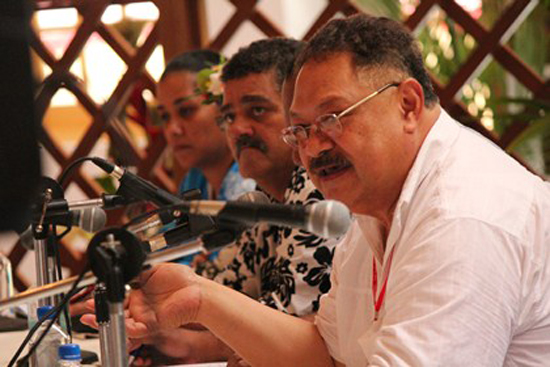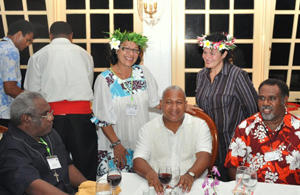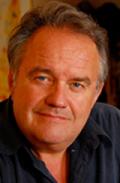
OPINION: Sometimes in a long career in journalism – and Grubsheet has been a scribe for nigh on 40 years – one reads or hears an account of an event at which one was present that bears so little resemblance to reality that one’s jaw drops in utter astonishment. So it was with the account given to Radio Australia on Thursday by Dr Marc Edge –the Canadian-born head of journalism at the University of the South Pacific – of last month’s gathering in Fiji of the Pacific Islands News Association (PINA), the region’s preeminent media organisation. Dr Edge and Grubsheet were both among the delegates at Pacific Harbour on Fiji’s Coral Coast. But our recollections of what took place are so vastly at odds that I wonder if we were on the same planet, let alone at the same venue in the same country.
In an interview with the influential Pacific Beat, the quietly spoken and somewhat enigmatic Dr Edge – having said nothing especially critical at the conference itself – let fly. He accused the PINA organisers of stifling dissent at the 2012 media summit and rejected their claims that it was marked by unity between previously warring factions. There was, he said, a lot of disagreement behind the scenes. But the PINA organisers had managed to keep a lid on it because many of the dissenters either weren’t present in Fiji or were there trying to act as conciliators.
The interview has triggered a furore, not least because Dr Edge’s comments have come out of left field a full month after the conference ended. There’s also a clear implication of misrepresentation on the part of those like Grubsheet who portrayed the 2012 summit as having healed many of the divisions of the past. I was genuinely gob-smacked to read Dr Edge pour scorn on my own account – and the accounts of others – that it was a genuinely peaceful affair, in sharp contrast to the previous gathering in Vanuatu three years ago when emotions were running so high that one delegate threatened to kill another. I’d cast it – based on comments by eminent Pacific journalists such as the Tongan publisher Kalafi Moala – as peace returning to the regional media after a period of tumult over how to respond to Frank Bainimarama’s 2006 Fiji coup.
But blow me down, if a month on, Marc Edge hits the airwaves blasting this interpretation as wrong and portraying PINA as a seething mass of discontent. Que? Where were the rest of us when all this disagreement was happening? It certainly wasn’t evident on the conference floor. Were a small coterie of malcontents plotting behind the scenes – so exclusive a club, perhaps, that no-one else noticed? On second thoughts, there was something strange going on. It’s just that we bumpkins didn’t realise it at the time.
All week, we’d heard dire predictions of the Fiji summit ending in conflict. It was all going to happen in the final session on the final day. Where were these predictions coming from? Well, strangely enough, from precisely the same Radio Australia reporter – Bruce Hill – who has now given Marc Edge the biggest crack at revisionism in recent Pacific media history.
Hill broadcasts
It’s all there in Hill’s broadcasts from the conference venue.
“I’m told that things will come to a head on Friday in the final session”, he intoned across the airwaves. It didn’t happen. Indeed, as the week progressed, Bruce Hill seemed to become increasingly exasperated that the PINA gathering was so, well, pacific. He complained at one point on air that it was “like attending a vicar’s tea party”. How frustrating when you’ve come all the way from Melbourne and the stoush you’ve promised your listeners -and your editors to justify all the expense – simply doesn’t materialise.
The head of the Suva-based PINA secretariat, Matai Akauola, said he was “appalled” by Marc Edge’s comments and hoped they didn’t represent those of the USP. But in a barb also aimed at Bruce Hill, Akauola said: “ The approach to dialogue and to find common ground is the ‘Pacific Way’, which people like Professor Edge cannot understand. We may be doing things differently but we are not wrong”, he said. All of which plays into the ongoing debate about whether the pugnacious paradigm of the Western media is appropriate for the practice of journalism in the island states and other developing countries. Because let’s face it. When you let someone like Bruce Hill loose on a function like PINA with even a whiff of division in the air, it’s a bit like putting a cat into a cage of canaries.
It’s pretty clear in the minds of conference organisers that Hill came to PINA spoiling for a fight, or at least to pursue his favoured narrative of a Pacific media umbrella in tatters by continuing division over Fiji. And when he didn’t get it at the conference itself, and his predictions of trouble amounted to nought, he simply bided his time until he could revive his narrative down the track. Enter Marc Edge – not an islander at all but a former working journalist and educator from Canada who’s been at USP for a mere eight months and had never attended a PINA conference before.
Dr Edge was publicly silent for the entire week of the summit about the divisions he now claims were present all along. Then precisely a month later, he chooses to vent. And presto. All the elements coalesce of yet another bout of the “conflict journalism” Bruce Hill and others like him in the region’s metropolitan media markets have recently been accused of peddling.
'Peace breaks out'
That charge was made by Professor David Robie of Auckland University of Technology's Pacific Media Centre – so esteemed that he’s described on Marc Edge’s own website as “probably the world’s foremost expert on Pacific media”. If that’s so, Dr Edge, then why so comprehensively trash David Robie’s own account of PINA for the AUT’s Pacific Scoop website in NZ, in which he also trumpeted the “peace breaks out” line?
What does it all mean? Well, In one fell swoop with his RA appearance, Dr Edge has set the scene for a “who’s right and who’s wrong” tussle between two of the region’s foremost journalism schools – Robie’s AUT and Edge’s USP. “Peace journalism” –as recently advocated by David Robie – versus “conflict journalism”, as seemingly favoured by Marc Edge, judging from his comments to Bruce Hill. Whatever course their own relationship takes, it’s a fair bet that young minds will be proxies in this struggle for months and years to come.
For my part, it’s certainly a comfort that “probably the world’s foremost expert on Pacific media” – Robie – corroborates my own recollection of what took place at PINA. I’d begun to think that my faculties had been distorted by the liquid refreshments on offer and the flattering attentions of journalistic ingenues. It was a peaceful affair – as we both faithfully reported in the first place – which axiomatically suggests that the main area of conflict may well have been in Marc Edge’s head.
Yes, there were people who stayed away from PINA because it was being held in Fiji. Yes, a breakaway organisation, PasiMA, was formed after the debacle in Vanuatu of mainly Polynesian delegates opposed to Fiji’s coup. Yes, one or two delegates at PINA – notably Terry Tavita, the pugnacious media advisor to the Samoan prime minister – made their displeasure felt. But for one of the region’s most prominent journalistic educators to seek to exacerbate that division when others are trying to build bridges speaks of a man who simply doesn’t grasp the subtleties and nuances of island relationships. Telling photo
Telling photo
There’s a photograph from PINA that reflects this better than any written explanation. It’s of two of Fiji’s biggest and most vocal Polynesian critics - Cook islanders Shona Pitt and Lisa Williams-Lahari – interacting with the “hated dictator”, Frank Bainimarama, on PINA’s opening night. Does it convey an image of conflict? Of loathing? On the contrary. It all looks pretty friendly and relaxed. As Matai Akauola puts it: “People like Marc Edge will not understand the Pacific. Maybe he would like to move the USP journalism school somewhere else."
It’s curious, to say the least, that on the one occasion Dr Edge spoke publicly at PINA, he said nothing about the burning issues of conscience that he felt moved to raise on RA a month later. He was part of a panel charged with the task of reflecting on the threats and challenges posed to individual journalists of the changing media landscape and the “urgent need to reinforce moral values in journalism”. What did we get instead from the head of journalism at the region’s preeminent place of learning? A rambling, unscripted few minutes about how Dr Edge had wound up in Fiji after sailing there on his yacht and what his students were doing at USP.
Underwhelmed was the overwhelming sentiment in the room when those present might have expected to be enlightened, if not uplifted. Yet it’s nothing compared to the deflation many feel across the region this weekend when a Pacific media guru whose job it is to lift journalistic standards gets it so spectacularly, comprehensively wrong.
This work is licensed under a Creative Commons Attribution-NonCommercial 3.0 New Zealand Licence.
WHO'S WHO IN PACIFIC MEDIA GROUPS
World Press Freedom Day and the advocates of Pacific media freedom




